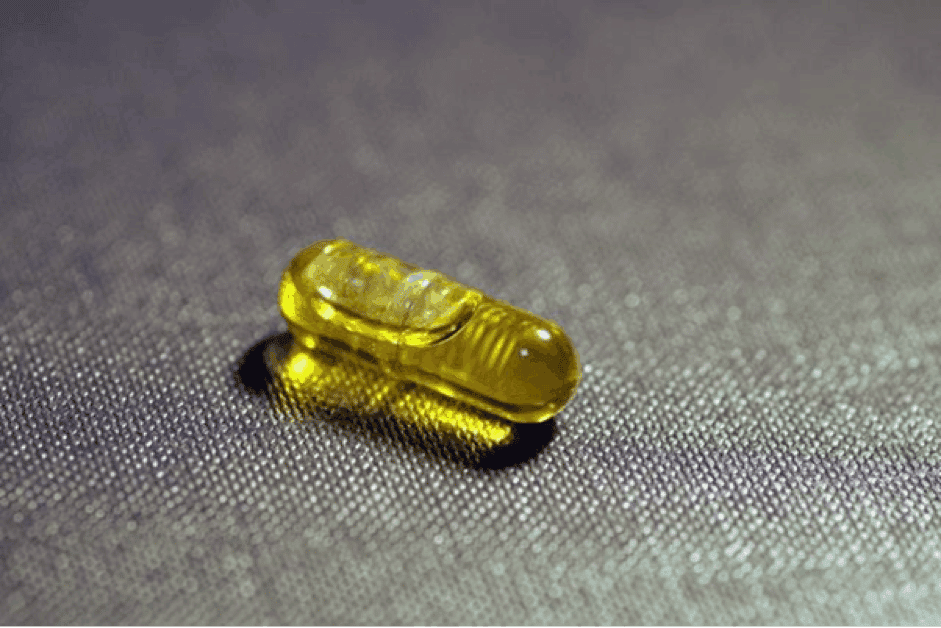
The benefits of fish oil are many. If your mother was anything like mine, every time fish was for dinner, you heard her say:
“Eat it up, you’ll be brainy!”
Fish oil has been known to help brain function, but what are other fish oil benefits?
Well, you may be surprised at the number of benefits of fish oil. Fish oil has a great impact on our body as almost every aspect of our health is related to fatty acids. Omega-3 fatty acids are essential for our bodies and it seems most of us are not consuming enough.
Here is a guide to some of the possible benefits for you taking this popular omega-3 supplement.
*As with any medication, you should consult your doctor before starting a supplement regimen to see if it is right for you and to check for side effects or possible interactions.
Benefits of Fish Oil
Containing the omega-3 fatty acids DHA and EPA, fish oils have been scientifically studied for their potential to benefit the body in many ways. Here’s a roundup of what science says are the benefits of fish oil.
Cardiovascular Health
According to the American Heart Association, cardiovascular disease affects over 93 million adults – to put that into perspective, that is one in three of the population. They recommend omega-3 fatty acid supplements high in triglycerides, such as fish oil, for sufferers of coronary artery disease. 1 2
Fish oil studies have proven to lower triglycerides, a type of fat (lipid) in your blood that is attributed to a higher risk of heart disease. 3
Fish oil studies have also noted other cardiovascular benefits of omega-3 in fish oils – in particular, survival rates for those who had suffered heart attacks. A study of individuals who had previously suffered a heart attack supplemented for six months with a high dosage of omega-3 fish oil. The outcome showed a significant improvement in the overall functioning of the heart. 4
Arthritis
According to the Arthritis organization, arthritic conditions eafect over 50 million Americans. Arthritic diets are recommended to have high omega-3 fatty acids, especially for the inflammatory forms of arthritis. 5 6
Studies with participants who suffered with rheumatoid arthritis showed omega-3s supplements had a significant reduction on joint pain. Another trial used fish oil to reduce arthritic pain using 1200 mg per day of omega-3 fatty acids; fish oil was shown to be a safer alternative than NSAIDs. 7
Alzheimer’s Disease
The link between a diet with fish oils and the potential benefits of helping those suffering with Alzheimer’s disease has been researched for many years. Fish oils contain the essential fatty acids vital for brain function. It has been found this helps slow cognitive decline. 8
Multiple research studies and trials have shown that increasing your intake of omega-3 fatty acids from fish oil, and specifically DHA, can protect against unhealthy brain aging – one of the causes of dementia. 9
One single study over six months looked at the use of fish oil supplements for helping brain atrophy in older adults. Findings concluded that fish oil was also effective at decreasing cognitive decline in participants. 10
Skin Health
The eicosapentaenoic acid (EPA) found in fish oils greatly benefits skin health. Research has shown that fish oils help with sunburnt skin particularly the inflammation caused by ultraviolet (UV) damage to the skin’s surface. 11
Fish oil supplements have shown to improve acne severity, study findings noted better results with individuals who suffered moderate to severe acne. 12
Eye Disorders
The use of omega-3 oils and dry eye disease has had a lot of scientific research as dry eye disease is indicated as a possible inflammatory cause. 13
Dry eye disease can lead to visual loss and is a very uncomfortable condition. A clinical trial recently used omega-3 fish oil supplements over a twelve week period and results showed a significant improvement in tear osmolarity. 14
Type II Diabetes
Diabetes is a big health issue in modern life. In America, 1 out of 3 adults have a predisposition to diabetes. Without weight loss and moderate physical activity, 15-30% of people with prediabetes, will develop type 2 diabetes within five years. 15
Studies into the impact of omega-3 fish oils in a diet to manage diabetes has shown that DHA and EPA might have positive effects with early intervention on glucose control and lipid levels. 16
Other studies are still preliminary but show potential for fish oil omega-3 to be used in the prevention and treatment of diabetic complications.17
Attention Deficit Hyperactivity Disorder (ADHD)
Those who suffer with ADHD were shown to have lower concentration of omega-3 polyunsaturated fatty acids in their blood. Omega-3 fatty acids are essential and needed by the body for proper brain function and development.
One study of children with ADHD did show a significant specific improvement in behavior and academic performance. Another study showed it was specifically docosahexaenoic acid (DHA) that had the positive improvements. 18 19
Both these trials are early studies and more evidence is needed to claim that specifically fish oil omega-3 fatty acids are beneficial to those suffering ADHD.
Cancer
Diets rich in omega-3 fatty acids have shown to be beneficial in preventative and curative effects for many forms of cancer, including colon, prostate, and breast. 20
The outcome of a study looking at fish oil supplements for breast cancer concluded:
“Supplementation of newly diagnosed breast cancer patients with EPA and DHA led to a significant change in the composition of plasma fatty acids, maintained the level of CD4+ T cells and serum levels of hsCRP, suggestive of a beneficial effect on the immune system and less active inflammatory response.” 21
Premenstrual Syndrome (Dysmenorrhea)
Painful menstrual cycles are very common in America according to the ACOG. 22 A recent study concluded that taking a fish oil supplement to help with the intensity of pain and other symptoms of dysmenorrhea meant a reduced amount of pain relief medication was taken.
This showed that the omega-3 fatty acids in fish oil had a positive effect and should be added to diet to help lessen the symptoms of pain associated with premenstrual syndrome.23
Side Effects of Fish Oil
Taking up to three grams of omega 3 fatty acids a day from fish oil is generally regarded as safe, according to the U.S. Food and Drug Administration. Fish oil supplements have few side effects; most noted are bad breath, indigestion, belching (fish burps), loose stools, and nausea. 24
To aid nutritional absorption and decrease undesired side effects, fish oil supplements are best taken with food. As with all fatty acid supplements, they should not be taken prior to exercise. 25
If you have a known allergy to fish or shellfish, it’s advisable to speak to your doctor before taking fish oil or to avoid fish oil supplements completely.
Fish oils have known interactions with prescribed medications if you are taking any of the following medicines consult your doctor first. 26
- Blood thinning medications (anticoagulant/antiplatelet drugs) such as warfarin.
- Blood pressure medications (Antihypertensive drugs).
- Birth control pills (Contraceptive drugs).
Individuals with type 2 diabetes may find it hard to control fasting blood sugar levels while taking fish oil supplements. You should take fish oil supplements under your doctor’s supervision.
Some concerns over environmental pollutants, such as mercury, contaminating fish oil products is discussed above. This is a minor concern with third party product testing and purchasing a reputable quality brand. There are probably more pollutants in whole fish than fish oil supplements.
Final Conclusion

Fish oil supplements are often taken as preventative – not as a treatment. Omega-3 essential fatty acids are vital to the body for optimal health, and supplementation is very effective.
Omega-3 deficiency can lead to serious health complications and fish oils are a safe way of getting a quality omega-3s in your diet.
Source
- http://www.heart.org/HEARTORG/HealthyLiving/HealthyEating/HealthyDietGoals/Fish-and-Omega-3-Fatty-Acids_UCM_303248_Article.jsp#.WggdkFVl_rc
- https://healthyforgood.heart.org/Eat-smart/Articles/Fish-and-Omega-3-Fatty-Acids
- https://www.ncbi.nlm.nih.gov/pubmed/21676848
- https://www.ncbi.nlm.nih.gov/pubmed/27482002
- http://www.arthritis.org/about-arthritis/
- http://blog.arthritis.org/living-with-arthritis/omega-3-fatty-acids-arthritis/
- https://www.ncbi.nlm.nih.gov/pubmed/16531187
- http://www.fasebj.org/content/29/7/2681.full?sid=0b1e849e-0add-4ead-91fa-b42f9d7f2b9f
- https://www.ncbi.nlm.nih.gov/pmc/articles/PMC4019000/
- https://www.ncbi.nlm.nih.gov/pubmed/24954371
- https://www.ncbi.nlm.nih.gov/pubmed/7561154
- https://www.ncbi.nlm.nih.gov/pmc/articles/PMC3543297/
- https://www.ncbi.nlm.nih.gov/pmc/articles/PMC4181435/
- http://journals.lww.com/corneajrnl/Fulltext/2016/09000/Effect_of_Oral_Re_esterified_Omega_3_Nutritional.7.aspx
- http://www.diabetes.org/diabetes-basics/statistics/cdc-infographic.html
- https://www.ncbi.nlm.nih.gov/pmc/articles/PMC4591987/
- https://www.ncbi.nlm.nih.gov/pubmed/24924805
- https://www.ncbi.nlm.nih.gov/pubmed/22596014
- http://www.nutritionjrnl.com/article/S0899-9007(12)00002-0/abstract
- http://www.umm.edu/health/medical/altmed/supplement/omega3-fatty-acids
- https://www.ncbi.nlm.nih.gov/pubmed/29061183
- https://www.acog.org/Patients/FAQs/Dysmenorrhea-Painful-Periods#how
- https://www.ncbi.nlm.nih.gov/pubmed/28356030
- https://www.fda.gov/downloads/food/ingredientspackaginglabeling/gras/noticeinventory/ucm422897.pdf
- https://labdoor.com/article/a-guide-to-timing-supplement-intake
- https://www.webmd.com/vitamins-supplements/ingredientmono-993-fish%20oil.aspx?activeingredientid=993
This is our guide to fish oil. Check out our other installments:
Everything You Need To Know About Fish Oil